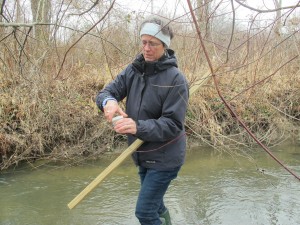EPA issues new rule to protect small waterways
-
Susan Phillips

Joanne Martin collects a sample of water from Brady Run, a stream in South Beaver Township in western Pennsylvania. She is a citizen scientist monitoring the water for potential pollution from nearby natural gas drilling.
Small headwater streams, tributaries and waterways will now be protected by the Clean Water Act under a new rule announced today by the Environmental Protection Agency and the Army Corps of Engineers. The move has a number of opponents including farmers and the oil and gas industry, who say it’s an overreach of federal authority.
The creation of the Clean Water Rule stems from ambiguous language in the Clean Water Act, which gives federal and state regulators authority to limit pollution of the nation’s “navigable” waterways. Several Supreme Court decisions ruled out wetlands from that definition, and created confusion regarding the EPA’s jurisdiction when it came to issuing permits for pollution discharges.
“The Clean Water Act has protected our health for more than 40 years and helped our nation clean up hundreds of thousands of miles of polluted waterways to the benefit of communities and businesses,” said EPA Administrator Gina McCarthy on a press call. “But Supreme Court cases in 2001 and 2006, put protection of 60 percent of our nations’ streams and millions of acres of wetlands into question.”
McCarthy says this new rule clarifies the waterways that will be protected under the Clean Water Act without eliminating the exemptions for agriculture.
The EPA created a map that shows almost all of Pennsylvania’s drinking water supplies are connected to seasonal, or headwater streams.
Jo-Ellen DArcy, assistant secretary for the Army Corps of Engineers said since the rulings, her agency had to engage in a long process to determine whether or not industrial activity even required a permit.
“It’s an important reminder that the Clean Water Act makes it illegal to pollute without a permit,” said Darcy. “Our rule will make it clear which waters are covered and which ones aren’t. We’ve always known streams and wetlands were important to downstream water quality. Today we have far better science that confirms how waters are connected to each other.”
Darcy said prior to making the final rule, the agencies reviewed 1,200 peer-reviewed studies.
The EPA also received more than a million comments, which some say was driven by a lobbying campaign that the agency had no legal authority to engage in. But McCarthy defended the effort.
“We did outreach on this rule that was very effective and exactly the job we should be doing, and we did nothing that would cross any legal lines here,” said McCarthy. “We simply used social media the way that everybody uses social media to inform the public, which is our job.”
Of the million-plus comments McCarthy says she heard plenty about the status of ditches.
“They asked us about ditches, they asked us about ditches and they asked us about ditches,” she said.
McCarthy says all the agricultural exemptions and exclusions are still in place, including ditches not connected to a tributary.
“So if you’re not a tributary and you’re a ditch, you ain’t in.”
The National Corn Growers Association issued a statement that they need to study the new rule before giving an opinion.
“We especially will look closely at how on-farm ditches, ponds and puddles are treated in the rule,” said NCGA president Chip Bowling.
Environmentalists praised the new rule. Myron Arnowitz with Clean Water Action says the rule takes into account the cumulative impact of pollution on small, sometimes unnamed waterways that feed into large watersheds like the Delaware and the Susquehanna.
“If you look at fracking, much of it is happening near small waterways,” said Arnowitz. “It’s affecting small bodies of water. Piece by piece it doesn’t look like much, but [now the EPA] is able to deal with a cumulative problem.”
A spokeswoman for the Department of Environmental Protection says the state is still evaluating the rule, including how it will impact regulation of agriculture and shale gas drilling. Pennsylvania enforces the Clean Water Act, as well as its own separate water regulations.
“Pennsylvania has always had robust water protection regulations and a scope of wetlands protection broader than the federal government and the federal rule does not change that,” said DEP spokeswoman Julie Lalo in an email.
















